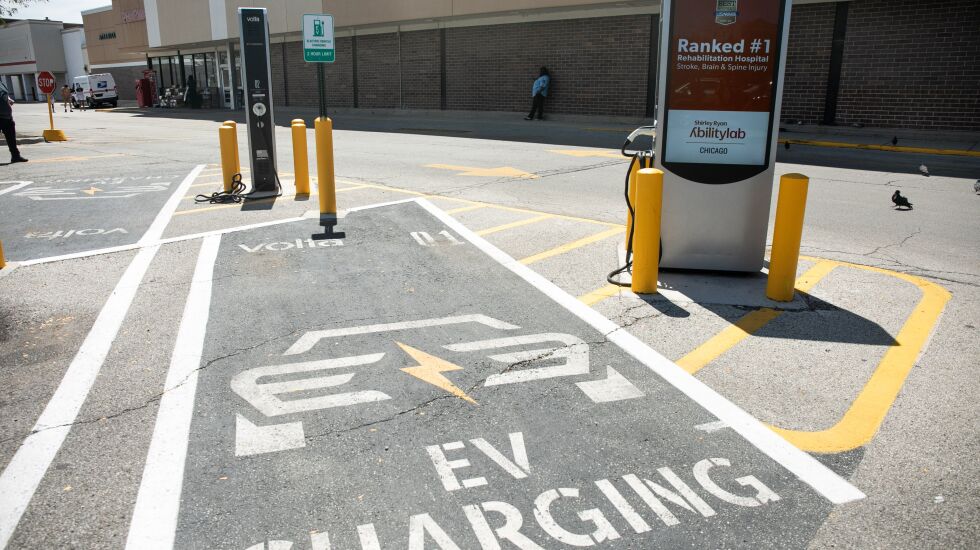
Are you an electric vehicle owner seeking a charge? Look for more spots to plug in as businesses move to install EV chargers.
Restaurants and retailers are jumping on the electrification bandwagon to attract customers.
The chargers also fill a gap in the EV-charging infrastructure, which lags growing EV sales.
“Retail is a narrow net profit industry, so you look for every way you can to find and attract customers,” said Rob Karr, president of the Illinois Retail Merchants Association.
“It meets a need [for chargers], and it separates you from your competition,” he said.
More drivers are expected to go electric as the cars become less expensive and incentives grow. On Wednesday, the U.S. Environmental Protection Agency handed down some of the strictest environmental targets for vehicles yet. The EPA’s pollution limits don’t require a certain number of EVs to be sold every year. Instead, they cut greenhouse gas emissions on vehicles sold starting in 2027.
If automakers comply, the EPA says that EV sales could grow from 7% of the market today to 67% by 2032. But the new rules come as a new poll found that only 4 in 10 people want an EV as their next car.
There are more than 51,000 electric vehicles registered in the Chicago area, but there are only about 1,300 public charging stations installed across the state. The charging infrastructure needs to catch up with sales, experts say
In the last few weeks, several national chains have said they are installing EV chargers.

Taco Bell opened its first charger in California and plans to open more elsewhere. Subway said it would open EV charging “oasis” locations, resembling drive-in diners.
And 7-Eleven said last month that it had launched a network of fast chargers, called 7 Charge, for neighborhoods that lack access.
Retailers also are jumping into the EV charging game, including Walmart’s announcement last week that it would install EV chargers coast to coast by the end of the decade. The retailer already offers more EV chargers than any other, with units at nearly 300 stores, and it expects to add chargers to thousands more.
Chevy Volt owner Don Anderson said he’ll chose to shop at one business over another based on the availability and quality of EV chargers available.
“If it’s a high-speed charger, then I will choose the business,” said Anderson, an Oak Park resident who retired four years ago from Schumacher Electric, which makes chargers for batteries and EVs.
EV chargers come in different speeds. Low-powered Level 1 chargers can take more than 40 hours to charge a vehicle. They use a standard 120-volt outlet. Midpowered Level 2 chargers can charge a car in four to 10 hours. Level 3, the highest level, also known as direct current or DC, can charge certain EVs to 80% of capacity in 20 minutes to an hour. But Level 3 requires high voltage and can cost tens of thousands of dollars to install.
Private companies are behind almost all of the EV chargers at businesses, which typically charge for their use.
Volta, a California-based company, has more than 275 quick chargers in the Chicago area, including at the United Center, Guaranteed Rate Field and chains Jewel-Osco, Amazon Fresh, Walgreens and Kohl’s.
Those public charging stations fill a gap in the EV-charging infrastructure, according to the company, as more EV drivers now live in apartments or condos without private chargers.
“We’re seeing more and more drivers without access to at-home charging, like the 39% of homes in the greater Chicago area that are in multifamily buildings (and) make the switch to an EV,” said John Stuckey, Volta’s vice president of public network development and data products.
Those drivers will, for the most part, depend on public chargers.
But nearly all EV drivers get by with at-home charging, according to the U.S. Department of Energy.
Anderson, the Volt owner, said he does most of his charging at home.
“Owning an EV is like having a fairy that fills your gas tank up three-fourths full,” he said. “If that happened, how often would you need to go to the gas station? That really changes people’s mindset. You don’t need charging out in the world that much.”
But for longer trips that he takes sometimes to Wisconsin or Michigan, he plans his stops around fast EV chargers at certain businesses along the way.
Using a slow charger during a half-hour lunch stop doesn’t make sense.
“It’s all math,” he said.
Chicago has tried to improve EV charger access at apartment buildings and condos by requiring new duplexes to be built ready to install EV chargers. And a bill in the state House aims to require EV chargers in all new homes and makes it easier for renters to install charging ports for themselves.







